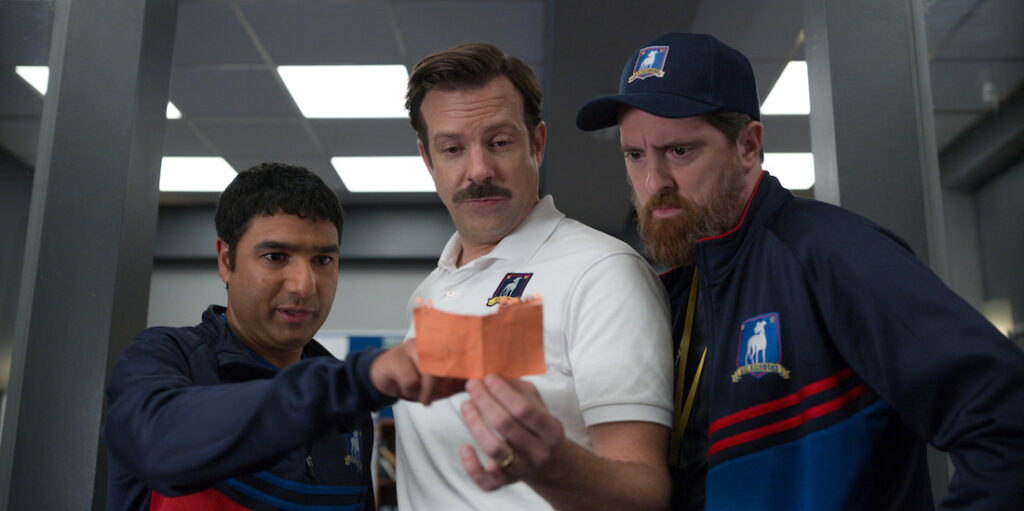The word “nice” has taken on more than just another term for “kind.” For some reason, it can be equated to a toothlessness, or safety; it’s dismissive as a retort too, like, “Oh, how was the Jason Sudeikis show on Apple TV?” “It was nice,” you could say, without indicating if that’s a good or bad thing. And indeed, here comes affable, good-hearted coach character Ted Lasso, played by Sudeikis with a mustache and Kansas twang that’s meant to be a clever joke itself. This here is a nice guy, and this is his nice new show, but it needs a lot of work on being funny.
Not that “Ted Lasso” tries to be anything it’s not—the opening title card is a perfect encapsulation. Sudeikis’ coach—removed from being an NBC Sports shorts mockumentary character and now in a feel-good plot—sits in an empty stadium while a wistful Marcus Mumford song plays. Lasso’s presence has a holy effect, turning graffitied blue chairs into clean red ones, showing the type of influence. His kindness is its own wave, and the colored chairs spell out his name like an imprint.
The series, created by Brendan Hunt, Joe Kelly, Bill Lawrence, and Sudeikis, puts the American coach’s kindness not so much to the test, but to use in a losing UK football club that has been overtaken by bitter people. The new owner Rebecca (Hannah Waddingham), it has been revealed, has taken on the Kansas City guy in order to purposefully tank the soccer club in order to get back at the previous owner, her cheating ex-husband. And in the locker room, there’s tension between some of the players, like egotistical top player Julian (Phil Dunster) and the far more mature Roy (Brett Goldstein). Lasso watches all of this, and while he may not know football, he believes his interest in people will be the primary way he leads the defunct team to victory.
Lasso is hardly ever wrong in his hunches on people, or the wise words he says to them. The magic of that only goes so far, especially when we’re watching a character whose appeal is that he’s both an underdog and he’s also failing upwards. Everybody has a line for when feel-good is just forced, and “Ted Lasso” sprint towards it.

The story’s gooey nature is fair game, but it’s nearly maddening by how unfunny it is, specifically being based around someone the world could use more of. In its first couple episodes especially, the series is dry when getting to know Sudeikis’ one-note ray of sunlight and filled with played-out jokes like the pronunciation of “jif” or a plethora of culture shock moments like Lasso calling tea “hot brown water.” Like much of the show, it all feels very safe, which is often just a nice word for lazy.
There’s a more personal side to Ted, and it’s telling that even when trying to give him a vulnerable spot, it doesn’t add up to much. He has a family back home including a kid that he loves, and a wife he is estranged from but wants to work it out with. And yet the first episode in particular shows how empty it is—a phone call conversation home feels lifeless just watching Sudeikis in a close-up talking into a phone, hoping that emotion will automatically arrive.
“Ted Lasso” is a little better, and a little more interesting with its biscuit-sized portions of niceness, when it expands to the other people. You get a sense of his kind words and positive affirmations changing how they act, like Juno Temple’s character Keeley. She starts off as Julian’s super model girlfriend, a support for his grotesque ego, and experiences an awareness that she does indeed deserve better people in her life. And Nick Mohammed is a bit of a scene-stealer playing Nate, a shy and bullied jersey-washing “kitman” with a knowledge of the game that Lasso knows he should listen to.
This has to be the first series in which there’s a credit for “Based on Pre-Existing Format / Characters from NBC Sports.” Lasso, an amusing goof when you catch him in those bits like the one linked above, feels a lot like an SNL character, and this in turn isn’t much different than a ‘90s “Saturday Night Live” movie that grabs a cult favorite and sends them off to fend for themselves in a feature. “Ted Lasso” takes on the challenge with an affable smile, and his simple presence is supposed to be charming. If you can forgive him for not being funny, maybe that sweetness is enough.
Five episodes screened for review.












